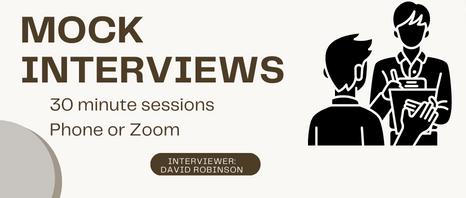
Mock Interviews Online or Phone
G’Day, looking to test your interview skills before the big day? Book a timeslot, and I’m happy to give you a trial interview and provide constructive feedback.
Bookings are on Eventbrite in 30-minute slots. Feel free to book 2 consecutively if your looking for more intensive feedback or having a few tries for each question.
After booking a slot, I’ll ask for a copy of your resume and any information you can provide on the position or role you’re after. The interview will be over Zoom. You don’t need to turn on your camera. If Internet access if limited or there are technical issues, I’m happy to do a voice call.
Book now at https://www.eventbrite.com.au/e/interview-coaching-tickets-610600822497
About David Robinson
Worked in Farming, Small to Medium businesses, and then into the Corporate world with Amazon.com. I took a break and travelled around 1/2 of Australia before landing in Tasmania to start fresh. I interviewed hundreds of people for various roles across many industries. I noticed a trend where people had the ability but lacked a constructive narrative to showcase and demonstrate that ability. This business is to help people step up and gain either employment or new opportunities by understanding where they need to focus (their skill or narrative gaps) to achieve the next activity.
General Interview Information
Before an interview, it’s important to:
- Research the company: Learn about the company’s mission, products, services, and culture. This will help you understand the company’s goals and what they seek in a candidate.
- Prepare answers to common interview questions: Review common interview questions, such as “Why do you want to work for this company?”, “Tell me about your biggest strengths and weaknesses”, and “What are your long-term career goals?”
- Review the job description: Make sure you understand the responsibilities and requirements of the role, so you can highlight how your skills and experience make you a good fit.
- Dress appropriately: Choose an outfit that is professional and appropriate for the company’s culture and industry.
- Plan your route and arrive early: Map out the location of the interview and plan to arrive at least 15 minutes early to allow for unexpected traffic or other delays.
- Prepare questions to ask: Prepare a list of questions to ask during the interview to show your interest in the company and the role.
Common interview questions include:
- Tell me about yourself.
- Why do you want to work for this company?
- What are your strengths and weaknesses?
- Can you tell me about a challenging situation you faced and how you dealt with it?
- What are your long-term career goals?
- Why should we hire you?
- Can you give an example of a time when you showed leadership?
- Can you tell me about a project you worked on that you are particularly proud of?
- How do you handle stress and pressure?
- Can you describe a time when you had to work with a difficult co-worker or manager?
It’s important to prepare answers to these common questions in advance, so you can articulate your skills, experience, and motivations in a clear and confident manner during the interview.
After an interview, it’s important to:
- Reflect on the interview: Take some time to think about the questions you were asked and how you answered them. Consider what went well and what you could have done better.
- Send a thank-you note: A prompt and thoughtful thank-you note is a great way to show your appreciation for the opportunity to interview and reiterate your interest in the role.
- Follow up: If you haven’t heard back from the interviewer within a week or two, it’s appropriate to send a brief follow-up email to inquire about the status of the hiring process.
- Keep your options open: If you receive an offer from another company, or if the company you interviewed with decides not to move forward with your application, it’s a good idea to keep your options open and continue searching for other opportunities.
- Prepare for the next interview: If you move on to the next round of interviews, use the feedback from the previous interview to improve your performance in the next one.